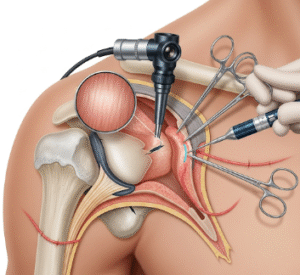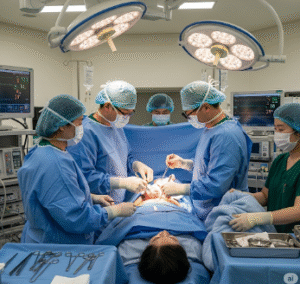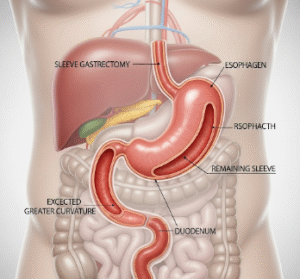Overview
Tropical Sprue is a rare digestive disorder characterized by malabsorption of nutrients due to inflammation and flattening of the small intestinal lining. It primarily affects individuals in tropical and subtropical regions but can also appear in travelers returning from endemic areas. The condition leads to deficiencies in vitamins and minerals, resulting in anemia, weight loss, diarrhea, and general weakness. South Korea, though not a tropical country, provides advanced diagnostic facilities, including endoscopy, histopathology, and laboratory testing, enabling early detection and effective treatment of Tropical Sprue in patients who have traveled abroad or present with malabsorption symptoms.
What is Tropical Sprue?
Tropical Sprue is a chronic intestinal disease that impairs the absorption of nutrients in the small intestine. It is marked by damage to the villi, the finger-like projections lining the intestine, which reduces the surface area available for nutrient absorption. The exact cause is not fully understood but is thought to involve bacterial overgrowth, environmental factors, and possible infectious agents. The condition can lead to deficiencies in folate, vitamin B12, and other essential nutrients. South Korean gastroenterologists employ advanced diagnostic tools such as small bowel biopsy, stool analysis, and blood tests to confirm the condition and differentiate it from other malabsorption syndromes.
Symptoms
Symptoms of Tropical Sprue vary in severity and can develop gradually. Common clinical manifestations include:
- Chronic diarrhea, often watery and persistent
- Weight loss and muscle wasting due to nutrient deficiencies
- Fatigue and general weakness
- Abdominal bloating, cramps, and discomfort
- Steatorrhea (fatty, foul-smelling stools)
- Glossitis (inflamed tongue) and mouth ulcers due to vitamin deficiencies
- Peripheral neuropathy or tingling in hands and feet from vitamin B12 deficiency
- Anemia, often megaloblastic, leading to pallor and shortness of breath
Early recognition of these symptoms in Korean healthcare facilities allows for prompt intervention and improved outcomes.
Causes
The exact cause of Tropical Sprue remains unclear, but several factors contribute to its development:
- Bacterial overgrowth: Abnormal proliferation of bacteria in the small intestine, possibly from chronic infections
- Environmental factors: Contaminated food or water in tropical regions may play a role
- Post-infectious triggers: Gastrointestinal infections, particularly bacterial or viral, may initiate villous atrophy
- Genetic predisposition: Some individuals may be more susceptible to developing malabsorption
- Nutritional deficiencies: Long-term deficiencies can exacerbate symptoms and intestinal damage
Understanding these factors helps Korean doctors tailor treatment plans to address both the underlying cause and nutritional consequences.
Risk Factors
Certain factors increase the likelihood of developing Tropical Sprue:
- Travel to tropical or subtropical regions where the condition is endemic
- Prolonged exposure to contaminated food or water
- Prior gastrointestinal infections or antibiotic use leading to altered gut flora
- Immunocompromised individuals, who may be more susceptible to chronic intestinal infections
- Poor nutritional status or existing vitamin deficiencies
Awareness of these risk factors helps Korean clinicians identify at-risk patients and implement preventive strategies.
Complications
If left untreated, Tropical Sprue can lead to serious complications:
- Severe nutrient deficiencies: Folate, vitamin B12, and iron deficiencies can cause anemia and neurological problems
- Growth retardation: In children, malabsorption can impair physical and cognitive development
- Osteoporosis: Long-term calcium and vitamin D deficiencies weaken bones
- Neuropathy: Vitamin B12 deficiency can result in irreversible nerve damage
- Immune compromise: Nutritional deficiencies weaken the immune system, increasing susceptibility to infections
- Chronic fatigue and weakness: Impaired nutrient absorption affects overall energy and quality of life
Prompt diagnosis and treatment in South Korea reduce the risk of these complications and improve patient outcomes.
Prevention
Prevention of Tropical Sprue focuses on hygiene, nutrition, and awareness during travel:
- Drink only safe, filtered, or boiled water when traveling to endemic regions
- Practice proper food hygiene and avoid undercooked or contaminated food
- Ensure adequate intake of vitamins and minerals, particularly folate and vitamin B12
- Seek early medical attention if gastrointestinal symptoms develop after travel
- Regular monitoring for malabsorption symptoms in at-risk individuals
Korean healthcare providers educate travelers and high-risk patients on preventive measures to reduce the incidence of Tropical Sprue.
Treatment Options in Korea
Treatment of Tropical Sprue in South Korea combines antimicrobial therapy, nutritional supplementation, and supportive care:
Diagnosis:
- Endoscopic examination with small bowel biopsy to assess villous atrophy
- Blood tests for vitamin B12, folate, iron, and other nutrient levels
- Stool analysis to exclude other infections and malabsorption causes
- Assessment of travel history and environmental exposure
Medical Treatments:
- Antibiotics: Tetracycline or doxycycline to address bacterial overgrowth in the intestine
- Vitamin supplementation: High-dose folate and vitamin B12 replacement to correct deficiencies
- Iron and other minerals: Oral or intravenous supplementation for anemia and micronutrient deficiencies
- Supportive therapy: Hydration, dietary modification, and symptom management for diarrhea and abdominal discomfort
Rehabilitation and Support:
- Nutritional counseling to maintain balanced intake during and after treatment
- Monitoring of weight, growth (in children), and laboratory markers to ensure recovery
- Follow-up care to prevent relapse and address chronic malabsorption
- Education on hygiene and safe travel practices for patients who may be exposed again
South Korean gastroenterologists and nutrition specialists provide comprehensive care, combining precise diagnosis, effective antimicrobial therapy, and targeted nutritional support to restore intestinal function and overall health.













